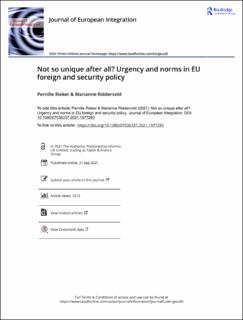| dc.contributor.author | Rieker, Pernille | |
| dc.contributor.author | Riddervold, Marianne | |
| dc.date.accessioned | 2022-11-11T09:24:49Z | |
| dc.date.available | 2022-11-11T09:24:49Z | |
| dc.date.created | 2021-09-21T14:53:47Z | |
| dc.date.issued | 2021 | |
| dc.identifier.citation | Journal of European Integration. 2021, . | en_US |
| dc.identifier.issn | 0703-6337 | |
| dc.identifier.uri | https://hdl.handle.net/11250/3031340 | |
| dc.description.abstract | The EU Global Strategy puts ‘principled pragmatism’ at the core of EU foreign and security policy. This has also been promoted as away of closing the gap between talk and action. Still, the concept has been widely criticized and interpreted as away of making the Union’s ‘organized hypocrisy’ less glaring. By exploring key EU foreign and security policy strategies and policies implemented over the past decade, this article suggests that a certain pattern for when the EU acts normatively and when it acts strategically can be identified. While the overall ambition is still to promote a more normative policy, also when it comes at a considerable economic cost, there is a limit to how it is willing to go. Evidence suggests that when faced with a situation perceived as urgent, the EU becomes more prone to implement policies that are at odds with its own principles. | en_US |
| dc.language.iso | eng | en_US |
| dc.rights | Navngivelse 4.0 Internasjonal | * |
| dc.rights.uri | http://creativecommons.org/licenses/by/4.0/deed.no | * |
| dc.subject | Crisis | en_US |
| dc.subject | EU foreign and security policy | en_US |
| dc.subject | interests | en_US |
| dc.subject | norms | en_US |
| dc.subject | principled pragmatism | en_US |
| dc.subject | security | en_US |
| dc.title | Not so unique after all? Urgency and norms in EU foreign and security policy | en_US |
| dc.type | Peer reviewed | en_US |
| dc.type | Journal article | en_US |
| dc.description.version | publishedVersion | en_US |
| dc.subject.nsi | VDP::Samfunnsvitenskap: 200 | en_US |
| dc.source.pagenumber | 15 | en_US |
| dc.source.journal | Journal of European Integration | en_US |
| dc.identifier.doi | 10.1080/07036337.2021.1977293 | |
| dc.identifier.cristin | 1936663 | |
| dc.relation.project | Norges forskningsråd: 288752 | en_US |
| dc.relation.project | Norges forskningsråd: 287131 | en_US |
| cristin.ispublished | true | |
| cristin.fulltext | original | |
| cristin.fulltext | original | |
| cristin.fulltext | original | |
| cristin.qualitycode | 1 | |

